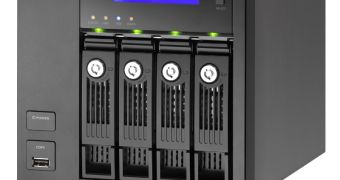Intel's range of central processing units is extensive, but if there is one area where it doesn't have much of an influence is that of cloud storage, compared to the likes of Apple, Google, Microsoft, Amazon and Dropbox at least.
Sure, certain chips it makes are found in storage devices and servers that enable cloud databases, but there is, or perhaps we should say there “was”, no actual cloud platform.
There is now, and we aren't talking about Evansport here. Intel has introduced the "Milstead" Atom S2550 and D2500 processors, while Thecus, Qnap and Austor have revealed NAS devices based on them.
"Intel's Atom processor provides an ideal solution for powering intelligent storage system designs that will act as a personal cloud inside the office or home, and will deliver better ways to store and access data," said David Tuhy, general manager of Intel storage division.
"With a range of systems designers on board, the Intel Atom processor-based storage solution raises the bar in how data is stored, managed and shared."
Protection and privacy are the two elements that Intel is focused on the most, though automated backup and file sharing among users will be added as well, eventually.
As for the chips themselves, they may not be the fastest in the world, but they do have integrated graphics capable of processing high-definition video. That way, it doesn't matter what sort of device is being used to run a film, as long as the network connection is good and the monitor is decent.
"QNAP's new HD Station, utilizing Intel Atom processor D2550 graphics capabilities, plays local and network media such as high-definition movies, home videos, pictures, and music -- all with the comfort of a big size screen via HDMI connection and a remote control, smartphone or any wireless USB keyboard or mouse,” said Jason Hsu, product manager of QNAP Systems Inc.
Atom D2500 is a 32nm, 1.86 GHz, 1 MB cache CPU with two cores, two threads and a TDP of 10W. The D2550 is similar, but has hyper-threading (4 threads instead of 2) and embedded options.

 14 DAY TRIAL //
14 DAY TRIAL //